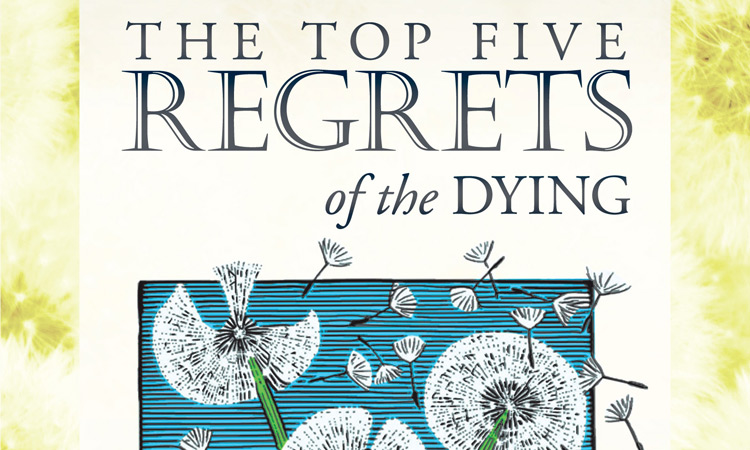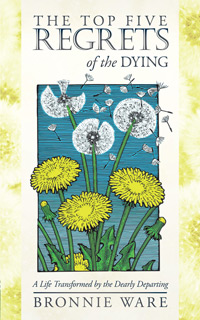 We know that dying is a natural part of life but our mind lives in denial either thinking that we never will or blocking the thought out completely in the hopes we will avoid it altogether. Have you ever wondered, what it’s like for someone to find out they only have a short time to live? Would someone who’s dying be able to find inner peace? Would they learn how to forgive themselves and others for past misdeeds? And what would they have regrets about? That they hadn’t made more money, or that they hadn’t been famous? Or even that they hadn’t taken that last final trip across the globe to the exotic place they’d always dreamt about?
We know that dying is a natural part of life but our mind lives in denial either thinking that we never will or blocking the thought out completely in the hopes we will avoid it altogether. Have you ever wondered, what it’s like for someone to find out they only have a short time to live? Would someone who’s dying be able to find inner peace? Would they learn how to forgive themselves and others for past misdeeds? And what would they have regrets about? That they hadn’t made more money, or that they hadn’t been famous? Or even that they hadn’t taken that last final trip across the globe to the exotic place they’d always dreamt about?
Bronnie Ware, an Australian palliative nurse who counseled the dying in their last days, discovered there was no mention of that, or even bucket lists like scaling Mount Everest. But what she did reveal as the most common regret was “I wish I hadn’t worked so hard.” In other words, people wished they had stopped to enjoy life more with those they loved.
 I just read Ware’s moving, bestselling book The Top Five Regrets of the Dying: A Life Transformed by the Dearly Departing. She recorded the dying’s last thoughts in her blog Inspiration and Chai. “For many years I worked in palliative care,” she says. “My patients were those who had gone home to die. Some incredibly special times were shared. I was with them for the last three to twelve weeks of their lives.
I just read Ware’s moving, bestselling book The Top Five Regrets of the Dying: A Life Transformed by the Dearly Departing. She recorded the dying’s last thoughts in her blog Inspiration and Chai. “For many years I worked in palliative care,” she says. “My patients were those who had gone home to die. Some incredibly special times were shared. I was with them for the last three to twelve weeks of their lives.
People grow a lot when they are faced with their own mortality. I learnt never to underestimate someone’s capacity for growth. Some changes were phenomenal. Each experienced a variety of emotions, as expected, denial, fear, anger, remorse, more denial and eventually acceptance. Every single patient found their peace before they departed though, every one of them.”
When questioned about any regrets they had or things they would do differently, common themes surfaced again and again. She says these are the most common five:
1. I wish I’d had the courage to live a life true to myself, not the life others expected of me.
“This was the most common regret of all. When people realize that their life is almost over and look back clearly on it, it is easy to see how many dreams have gone unfulfilled. Most people had not honored even a half of their dreams and had to die knowing that it was due to choices they had made, or not made. Health brings a freedom very few realize, until they no longer have it.”
2. I wish I hadn’t worked so hard.
“This came from every male patient that I nursed. They missed their children’s youth and their partner’s companionship. Women also spoke of this regret, but as most were from an older generation, many of the female patients had not been breadwinners. All of the men I nursed deeply regretted spending so much of their lives on the treadmill of a work existence.”
3. I wish I’d had the courage to express my feelings.
“Many people suppressed their feelings in order to keep peace with others. As a result, they settled for a mediocre existence and never became who they were truly capable of becoming. Many developed illnesses relating to the bitterness and resentment they carried as a result.”
4. I wish I had stayed in touch with my friends.
“Often they would not truly realize the full benefits of old friends until their dying weeks and it was not always possible to track them down. Many had become so caught up in their own lives that they had let golden friendships slip by over the years. There were many deep regrets about not giving friendships the time and effort that they deserved. Everyone misses their friends when they are dying.”
5. I wish that I had let myself be happier.
“This is a surprisingly common one. Many did not realize until the end that happiness is a choice. They had stayed stuck in old patterns and habits. The so-called ‘comfort’ of familiarity overflowed into their emotions, as well as their physical lives. Fear of change had them pretending to others, and to their selves, that they were content, when deep within, they longed to laugh properly and have silliness in their life again.”
6. Facing death with honest acceptance
These are regrets which I’m sure resonate with many of us, like they do me, even when we are not in our final stages. But not many of us want to think about mortality. Ware adds that rather than acknowledge the existence of death, “we try to hide it. It is as if we are trying to convince ourselves that ‘out of sight, out of mind’ really works. But it doesn’t, because we carry on trying to validate ourselves through our material life and associated fearful behavior instead. If we are able to face our own inevitable death with honest acceptance, before we have reached that time, then we shift our priorities well before it is too late. This gives us the opportunity to then put our energies into directions of true value. Once we acknowledge that limited time is remaining, although we don’t know if that is years, weeks or hours, we are less driven by ego or by what other people think of us. Instead, we are more driven by what our hearts truly want. This acknowledgment of our inevitable, approaching death, offers us the opportunity to find greater purpose and satisfaction in the time we have remaining.” And that is the gift that the dying give to the living.

Rose Caiola
Inspired. Rewired.
To find out more about Rose’s thoughts on how to live a happier life, click here

